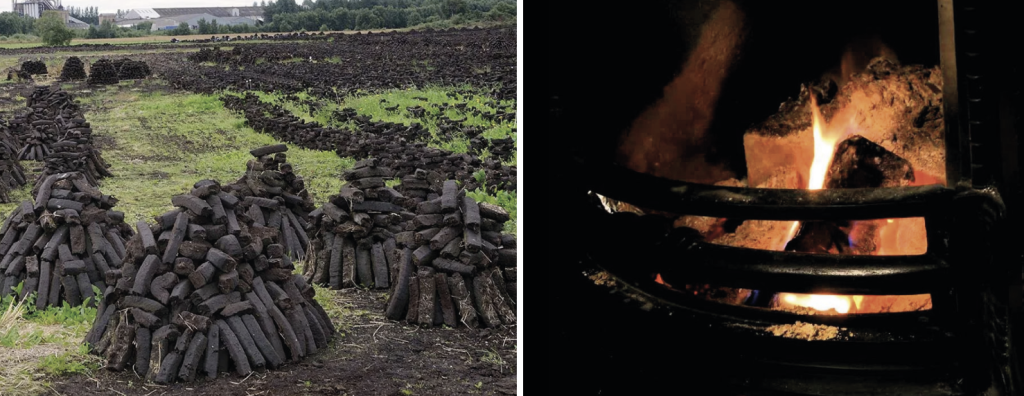Choose sustainability – the benefits of Woodlets Briquettes over peat briquettes
In our quest for sustainable living, how we heat our homes matters. From the products we buy to the energy sources we use, each decision can contribute to environmental degradation or it helps preserve our planet for future generations. Therefore, when it comes to heating our homes, choosing Woodlets Briquettes over peat briquettes can significantly impact our carbon footprint and overall sustainability efforts.
Peat, which consists of deep layers of partially decomposed moss and other plant matter, has been widely used in our fires for centuries. It has been used to heat homes and distilleries and fuel power plants. In the 1960s, it accounted for nearly 40% of Ireland’s electricity. However, peat is highly polluting the environment. In 2016, peat was responsible for almost 8% of Ireland’s electricity generation, but it also accounted for 20% of carbon emissions.

When bogs are drained to harvest peat or for any other use, such as agriculture, grazing, or forestry, exposure to oxygen jump-starts the decomposition of the stored organic matter, releasing carbon into the atmosphere. A 2013 study of Irish peatland carbon emissions, published in Irish Geography, found that each hectare of industrially drained and stripped peatland emits 2.1 tons of carbon per year – the equivalent of driving a car 30,000 kilometres. And that’s before the harvested peat is burned.
Woodlets Briquettes offer a range of benefits over peat briquettes. Let’s have a look into the reasons why opting for Woodlets is a greener and more environmentally responsible choice.
Peat Briquettes vs Woodlets Briquettes
- Renewable Resource: Woodlets Briquettes are manufactured from sustainably sourced wood, such as rejected logs from sawmills left over on the forestry floor – making them the ideal renewable energy source. In addition, we source all our wood from responsibly managed FSC® forests. Every tree used is replanted, which adds up to over 6 million a year, all within an 80-mile radius of our factory. In contrast, peat briquettes are extracted from peat bogs, which are non-renewable resources that take centuries to form and grow about 1mm a year.
- Reduced Carbon Emissions: Burning wood releases carbon dioxide, but since wood is a renewable resource, the carbon emitted is offset by the regrowth of replanted trees. On the other hand, peat is one of the most effective carbon stores in the world. Ecologically, peatlands are our rainforests. Peat releases large amounts of stored carbon when harvested and burned, contributing significantly to greenhouse gas emissions and climate change. Every hectare of drained peatland emits two tonnes of carbon per annum. Peat, along with imported coal and other smoky fuels, is blamed for air pollution that kills 1,300 people each year.
- Preservation of Peatlands: Peatlands are crucial carbon sinks and habitats for diverse plant and animal species. Harvesting peat for fuel destroys these ecosystems, releasing stored carbon and disrupting fragile habitats. Choosing Woodlets Briquettes over peat briquettes helps preserve these vital ecosystems and mitigates biodiversity loss. Read more about our responsibly managed forests here.
- Higher Energy Efficiency: Woodlets Briquettes typically have a higher energy content and burn more efficiently than peat briquettes. This means that less fuel is required to produce the same heat, resulting in lower energy consumption and cost savings for consumers.
- Minimal Ash Residue: Compared to peat briquettes, Woodlets Briquettes produce minimal ash residue, reducing the need for frequent cleaning and maintenance of stoves and chimneys. In addition, Woodlets Briquettes are easy to move and store, with no dust and a pine-fresh scent. This convenience makes Woodlets Briquettes a practical choice for heating homes while minimising environmental impact.
- Support for Sustainable Forestry: By choosing our briquettes, consumers support sustainable forestry practices and the responsible management of forests. This helps promote biodiversity, protect wildlife habitats, and ensure the long-term availability of wood as a renewable energy source.
‘Ecologically, peatlands are our rainforests’
In conclusion, opting for Woodlets Briquettes over peat briquettes is a simple yet impactful way to reduce our carbon footprint, preserve vital ecosystems, and support sustainable living practices. By making conscious choices in our daily lives, we can contribute to a more sustainable future for ourselves and future generations.
Woodlets Briquettes are proud to be affiliated to GROWN IN BRITAIN
Sources used:
www.science.org/content/article/power-peat-more-polluting-coal-its-way-out-ireland
www.nature.scot/climate-change/nature-based-solutions/peatland-action
